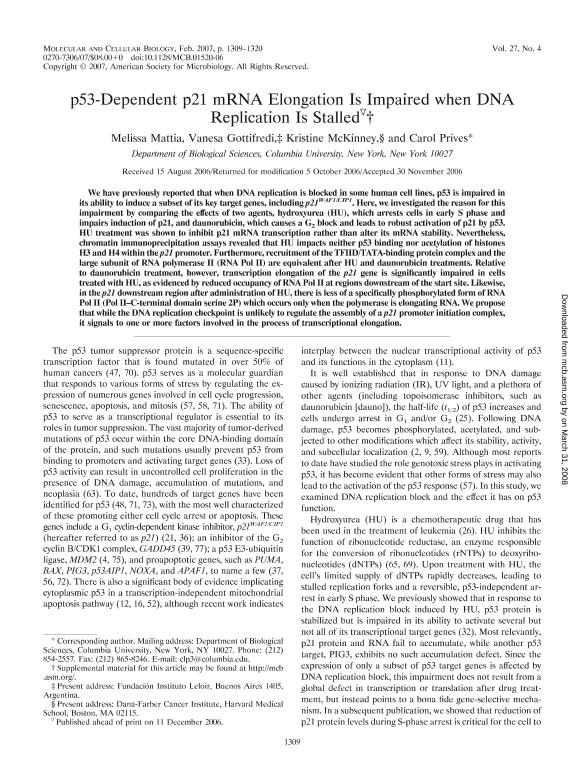Artículo
p53-Dependent p21 mRNA elongation is impaired when DNA replication is stalled
Fecha de publicación:
12/2006
Editorial:
American Society for Microbiology
Revista:
Molecular and Cellular Biology
ISSN:
0270-7306
e-ISSN:
1098-5549
Idioma:
Inglés
Tipo de recurso:
Artículo publicado
Clasificación temática:
Resumen
We have previously reported that when DNA replication is blocked in some human cell lines, p53 is impaired in its ability to induce a subset of its key target genes, including p21(WAF1/CIP1). Here, we investigated the reason for this impairment by comparing the effects of two agents, hydroxyurea (HU), which arrests cells in early S phase and impairs induction of p21, and daunorubicin, which causes a G(2) block and leads to robust activation of p21 by p53. HU treatment was shown to inhibit p21 mRNA transcription rather than alter its mRNA stability. Nevertheless, chromatin immunoprecipitation assays revealed that HU impacts neither p53 binding nor acetylation of histones H3 and H4 within the p21 promoter. Furthermore, recruitment of the TFIID/TATA-binding protein complex and the large subunit of RNA polymerase II (RNA Pol II) are equivalent after HU and daunorubicin treatments. Relative to daunorubicin treatment, however, transcription elongation of the p21 gene is significantly impaired in cells treated with HU, as evidenced by reduced occupancy of RNA Pol II at regions downstream of the start site. Likewise, in the p21 downstream region after administration of HU, there is less of a specifically phosphorylated form of RNA Pol II (Pol II-C-terminal domain serine 2P) which occurs only when the polymerase is elongating RNA. We propose that while the DNA replication checkpoint is unlikely to regulate the assembly of a p21 promoter initiation complex, it signals to one or more factors involved in the process of transcriptional elongation
Archivos asociados
Licencia
Identificadores
Colecciones
Articulos(IIBBA)
Articulos de INST.DE INVEST.BIOQUIMICAS DE BS.AS(I)
Articulos de INST.DE INVEST.BIOQUIMICAS DE BS.AS(I)
Citación
Mattia, Melissa; Gottifredi, Vanesa; McKinney, Kristine; Prives, Carol; p53-Dependent p21 mRNA elongation is impaired when DNA replication is stalled; American Society for Microbiology; Molecular and Cellular Biology; 27; 4; 12-2006; 1309-1320
Compartir
Altmétricas




